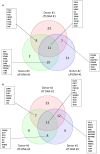Immune Reactivation by Cell-Free Fetal DNA in Healthy Pregnancies Re-Purposed to Target Tumors: Novel Checkpoint Inhibition in Cancer Therapeutics
- PMID: 26379664
- PMCID: PMC4549650
- DOI: 10.3389/fimmu.2015.00424
Immune Reactivation by Cell-Free Fetal DNA in Healthy Pregnancies Re-Purposed to Target Tumors: Novel Checkpoint Inhibition in Cancer Therapeutics
Abstract
The role of the immune system in cancer progression has become increasingly evident over the past decade. Chronic inflammation in the promotion of tumorigenesis is well established, and cancer-associated tolerance/immune evasion has long been appreciated. Recent developments of immunotherapies targeting cancer-associated inflammation and immune tolerance, such as cancer vaccines, cell therapies, neutralizing antibodies, and immune checkpoint inhibitors, have shown promising clinical results. However, despite significant therapeutic advances, most patients diagnosed with metastatic cancer still succumb to their malignancy. Treatments are often toxic, and the financial burden of novel therapies is significant. Thus, new methods for utilizing similar biological systems to compare complex biological processes can give us new hypotheses for combating cancer. One such approach is comparing trophoblastic growth and regulation to tumor invasion and immune escape. Novel concepts regarding immune activation in pregnancy, especially reactivation of the immune system at labor through toll like receptor engagement by fetal derived DNA, may be applicable to cancer immunotherapy. This review summarizes mechanisms of inflammation in cancer, current immunotherapies used in the clinic, and suggestions for looking beyond oncology for novel methods to reverse cancer-associated tolerance and immunologic exhaustion utilizing mechanisms encountered in normal human pregnancy.
Keywords: cell-free fetal DNA; circulating tumor DNA; immunotherapy; inflammation; toll like receptors.
Figures


Similar articles
-
Immune Checkpoint Inhibitors: New Insights and Current Place in Cancer Therapy.Pharmacotherapy. 2015 Oct;35(10):963-76. doi: 10.1002/phar.1643. Pharmacotherapy. 2015. PMID: 26497482 Review.
-
Immune Checkpoint inhibitors: An introduction to the next-generation cancer immunotherapy.J Clin Pharmacol. 2016 Feb;56(2):157-69. doi: 10.1002/jcph.591. Epub 2015 Sep 29. J Clin Pharmacol. 2016. PMID: 26183909 Review.
-
[Control of innate immune system for cancer therapy].Med Sci (Paris). 2013 Nov;29(11):985-90. doi: 10.1051/medsci/20132911014. Epub 2013 Nov 20. Med Sci (Paris). 2013. PMID: 24280501 Review. French.
-
Immune checkpoint modulation: rational design of combination strategies.Pharmacol Ther. 2015 Jun;150:23-32. doi: 10.1016/j.pharmthera.2015.01.003. Epub 2015 Jan 10. Pharmacol Ther. 2015. PMID: 25583297 Review.
-
Immune checkpoint blockade opens an avenue of cancer immunotherapy with a potent clinical efficacy.Cancer Sci. 2015 Aug;106(8):945-50. doi: 10.1111/cas.12695. Epub 2015 Jul 2. Cancer Sci. 2015. PMID: 25981182 Free PMC article. Review.
Cited by
-
Circulating nucleic acids: An analysis of their occurrence in malignancies.Biomed Rep. 2017 Jan;6(1):8-14. doi: 10.3892/br.2016.812. Epub 2016 Nov 16. Biomed Rep. 2017. PMID: 28123700 Free PMC article.
-
Inflammation-mediated generation and inflammatory potential of human placental cell-free fetal DNA.Placenta. 2020 Apr;93:49-55. doi: 10.1016/j.placenta.2020.02.016. Epub 2020 Feb 24. Placenta. 2020. PMID: 32250739 Free PMC article.
-
Reduced Placental CD24 in Preterm Preeclampsia Is an Indicator for a Failure of Immune Tolerance.Int J Mol Sci. 2021 Jul 28;22(15):8045. doi: 10.3390/ijms22158045. Int J Mol Sci. 2021. PMID: 34360811 Free PMC article.
-
Molecular characterisation of the synovial fluid microbiome in rheumatoid arthritis patients and healthy control subjects.PLoS One. 2019 Nov 21;14(11):e0225110. doi: 10.1371/journal.pone.0225110. eCollection 2019. PLoS One. 2019. PMID: 31751379 Free PMC article.
-
Expression of CD24 and Siglec-10 in first trimester placenta: implications for immune tolerance at the fetal-maternal interface.Histochem Cell Biol. 2017 May;147(5):565-574. doi: 10.1007/s00418-016-1531-7. Epub 2016 Dec 23. Histochem Cell Biol. 2017. PMID: 28012129
References
Publication types
Grants and funding
LinkOut - more resources
Full Text Sources
Other Literature Sources
Miscellaneous

